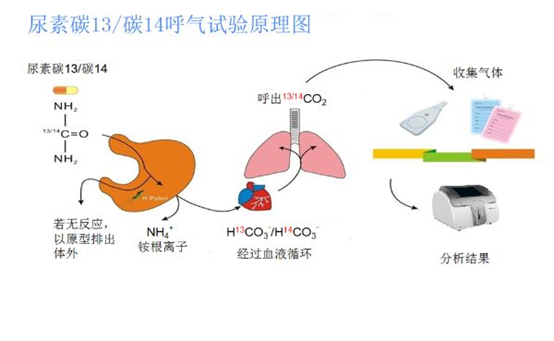Urease does not exist in mammalian cells, and Helicobacter pylori (Hp) can produce highly active urease. Since no other types of bacteria have been found in the human stomach, the presence of urease in the human stomach is evidence of Helicobacter pylori (Hp) infection.
The subject takes 13C/14C-labeled urea. The urease secreted by Helicobacter pylori will decompose the urea to produce 13C/14C-labeled carbon dioxide, which is exhaled from the lungs after circulating through the blood. The use of appropriate technology to collect the carbon dioxide gas exhaled by the examinee and detect it on a highly sensitive instrument can determine whether there is Helicobacter pylori infection in the stomach.



